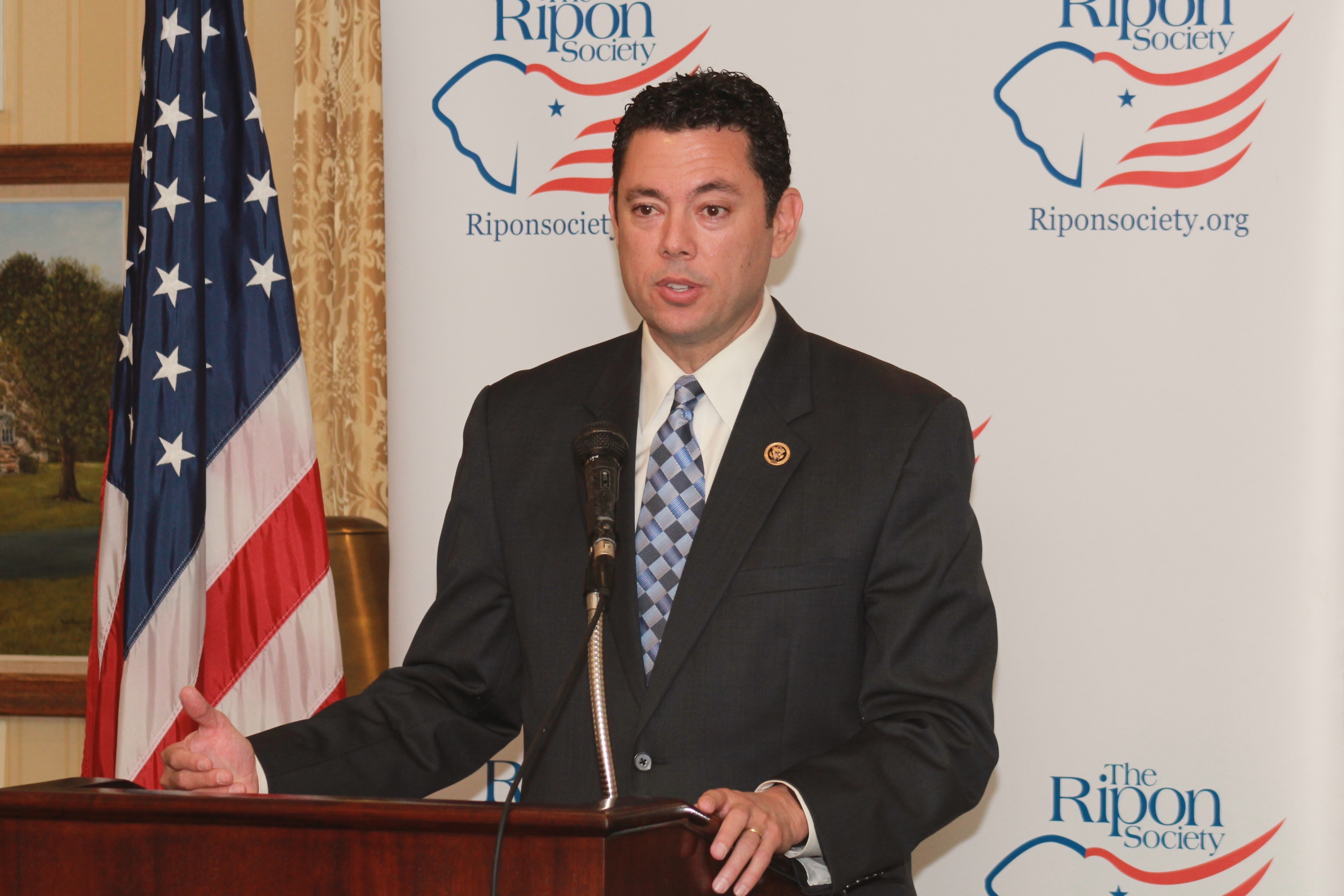 Chairman Chaffetz Discusses the Bipartisan Effort He is Leading to Make Government More Accountable
Chairman Chaffetz Discusses the Bipartisan Effort He is Leading to Make Government More Accountable
WASHINGTON, DC – U.S. Rep. Jason Chaffetz (UT-3) appeared before a breakfast meeting of The Ripon Society yesterday morning, delivering a speech about his longtime interest in the Oversight and Government Reform Committee, his selection as Chairman of the panel this past fall, and the bipartisan effort he is leading with the Committee’s ranking Democrat to make the federal government more accountable.
“I’m still kind of pinching myself that I get to do this,” stated Chaffetz, who is serving only his fourth term. “Before I came to Congress, I really did study what the committees looked like and who did what. I found this little committee that had the ability to investigate anything at any time. And I thought, ‘If you want to do everything, get on the Oversight and Government Reform Committee. So when I showed up, I talked to John Boehner, Eric Cantor and Kevin McCarthy. They asked what’s your biggest interest, and I said Oversight and Government Reform. And they said, ‘That’s available!’ Then, after my first term, I visited with John Boehner and he said, ‘You did great – I’ll put you on any committee you want. If you want to be on Appropriations, we’d like to put you on Appropriations.’ I asked if I could still be on Oversight and Government Reform, and he said, ‘No, you can’t do that.’ I said, ‘Well, I’m not doing it.’ And he replied, ‘You’re smart, because most people don’t focus on it.’
“I said I wanted to try to become the next Chairman. If it was about seniority, tell me now and I’ll wait it out. But if it was going to be about who was going to be working hard, rolling up their shirtsleeves, getting after it, focusing on the Committee, then I’d like to give it a go even though I’m pretty young around here. He said he believed in that. And if you look at John Boehner’s background, he jumped over a few folks too to become Chairman of the Education and Workforce Committee. So we did it, we were successful, and I’m very fortunate.”
Chaffetz noted that the origin of the committee dates back to the early 1800s, when Congress established a panel to oversee the Executive Branch. He also noted that Abraham Lincoln served on the committee during his one term in the House of Representatives, and made a name for himself by challenging then-President Polk on where the first shots were fired in the Mexican-American War. Polk had argued the shots were fired on American soil. Lincoln believed otherwise.
“He gave at least nine different speeches about this, and was dogged in his approach to the President,” Chaffetz said. “It ended up that Abraham Lincoln was right… It’s inspirational to me, because that’s what we’re supposed to do. We’re not supposed to be a cheerleader for the Executive Branch. Now, how you do this I would argue is very important. Politics is the art of persuasion. You’re not there in my opinion to just be the person who yells and screams and figures out how to creatively call someone a bad name. I really do believe that most issues can be bipartisan, and that you do need to reach out and work with the other side. Probably the most important piece of advice I got from John Boehner when I came here was, ‘You can disagree. Just don’t be disagreeable.’ And I think that’s absolutely right. You can have a vigorous debate – that’s what we’re supposed to do in Congress. But how you do that is very important. I’m proud of the relationship I have with Elijah Cummings. He and I disagree probably pretty much on everything. But we have co-signed now more than 200 letters together to the Administration. And I’ll tell you, when the Oversight Committee sends a letter to the Administration, it’s usually not a thank you note. So the idea that we have done this together — we have had great success. More people have had to leave the Administration than we’ve seen in the past.”
To that end, Chaffetz noted that the DEA Administrator was recently forced to resign in the wake of allegations involving mismanagement and possible corruption dating back to 2011. He also pointed to the Secret Service, where additional personnel changes are underway, as well. “I don’t think the Secret Service has had any oversight over the past 15 to 20 years,” he stated. “They’re not above oversight. There are still a lot of fundamental changes and alterations that have to happen there.”
The Oversight Committee Chairman also discussed another case of federal mismanagement that has been in the news of late – the massive data breach at the Office of Personnel Management.
“Since 1985, OPM has had these records,” he said. “They claim to have 32 million people who have filled out this Standard Form 86, which in some places can be a hundred-plus pages of very in-depth and personal information. And yet the Office of Personnel Management is working on a Cobalt operating system – something that was implemented in the 1960s. It has no duel authentication, no encryption, and is something that the inspector general had been warning about for nearly a decade. It got so bad last year that the inspector general literally wrote to the OPM Director and said, ‘Unplug it! Turn it off! You’re going to lose all the data!’ And sure enough, they did. It’s probably the biggest data breach in the history of our country, and certainly our government. If you compare it to some of the things that happened with Snowden and Chelsea Manning, you’re going to look back on this and say it was by far the biggest, most difficult to deal with, because you have so much information about people who are in the government. My sense of it is that this was not some hacker who was trying to figure out how to do a credit card scam so they could go down to Best Buy and steal a few computers. This is a national intelligence problem that we will be dealing with for decades to come.
“I do appreciate the President’s initial appointment of Beth Cobert as the acting Director. She has 15 or so years at McKinsey & Co. and Nokia. She’s a much more serious player. Unfortunately, the President had put in someone in Katherine Archuleta, who was his political director on Obama for President. She had absolutely no business running what is really the largest human resources operation on the face of the planet. She had no technical background whatsoever, no experience dealing with these major computer issues. One other statistic I’ll leave you with on the OPM front — since President Obama has taken office, the federal government has spent in excess of $525 billion dollars on IT. And it doesn’t work. It doesn’t work. Our committee’s going to continue to look at that. It’s not the biggest, sexiest headline, but I don’t know how you can spend a half trillion dollars and literally have… The IRS still uses the DOS operating system. You have a Patent office that just got Windows 97. They don’t even service Windows 97 anymore! And yet they just got it. So the procurement process is really, really broken in this regard.”
Chaffetz concluded his remarks by talking about another significant area his panel has been focusing on – namely, mismanagement and possible corruption at the Internal Revenue Service.
“Probably the biggest thing our Committee is looking at is the IRS,” the Utah lawmaker declared. “You have political targeting that is factual at this point. There are no ifs, ands or buts. You had groups within the IRS who were politically targeting conservatives and impeding their First Amendment rights. You’re going to continue to hear more about this. Because when the targeting became evident, the Oversight and Government Reform Committee put in place a subpoena for the documents – a small window of Lois Lerner’s e-mails. Internally, the IRS put a preservation order in place — don’t destroy or get rid of any of these documents. These documents and e-mails were in the possession of the IRS. And on March 4, 2014, they destroyed them.
“Imagine if the IRS had given you a summons for you to produce documents. You had them in your possession, and then you destroyed them. What would happen to you? Do you think they would say, ‘Oh, darn it!’ No, which is why Congress has to stand up for itself. You cannot — with a duly issued subpoena and eternal preservation order in place — go out and destroy documents and say there is no consequence to that; nobody’s going to be held accountable, and nobody is at fault. And yet that’s essentially what we’ve heard from the President, who has said repeatedly there is not even a ‘smidgeon’ of corruption. He was on the Daily Show with Jon Stewart the other night and said, ‘You know what the real scandal is? The real scandal is that the IRS is underfunded. They need more agents, more people, and Congress passed a bad law.’ You know this ridiculous law the president is talking about? It was passed in 1913. He makes it look as if we had passed this law. That little detail he said on the Daily Show, you’re going to see that surface. We will continue to pursue this, and I promise you – there will be news on the IRS side as early as next week. So stay tuned.”
To view Chairman Chaffetz’s remarks before The Ripon Society’s breakfast discussion yesterday morning, please click on the link below:
The Ripon Society is a public policy organization that was founded in 1962 and takes its name from the town where the Republican Party was born in 1854 – Ripon, Wisconsin. One of the main goals of The Ripon Society is to promote the ideas and principles that have made America great and contributed to the GOP’s success. These ideas include keeping our nation secure, keeping taxes low and having a federal government that is smaller, smarter and more accountable to the people.



